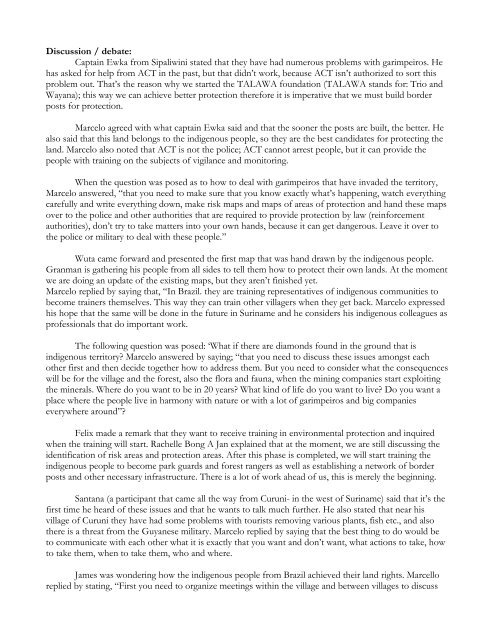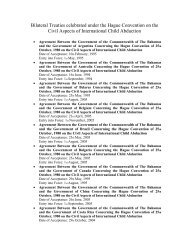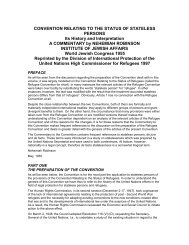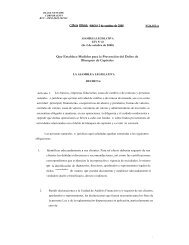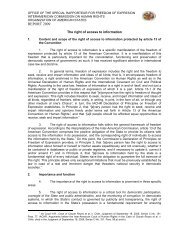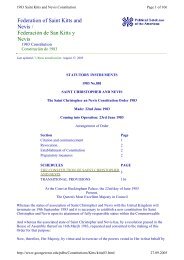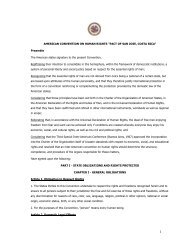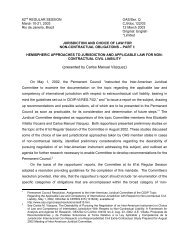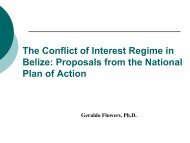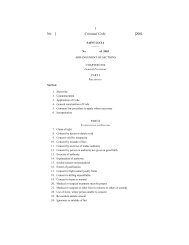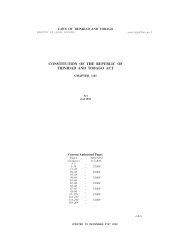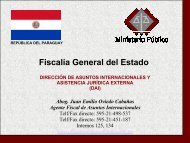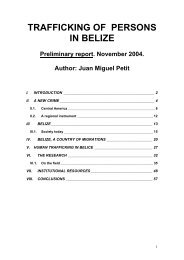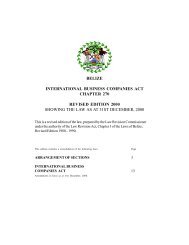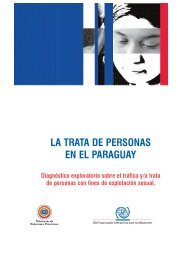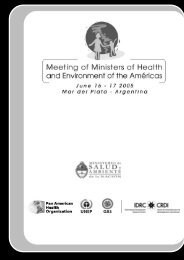Transboundary meeting on environmental protection
Transboundary meeting on environmental protection
Transboundary meeting on environmental protection
Create successful ePaper yourself
Turn your PDF publications into a flip-book with our unique Google optimized e-Paper software.
Discussi<strong>on</strong> / debate:<br />
Captain Ewka from Sipaliwini stated that they have had numerous problems with garimpeiros. He<br />
has asked for help from ACT in the past, but that didn’t work, because ACT isn’t authorized to sort this<br />
problem out. That’s the reas<strong>on</strong> why we started the TALAWA foundati<strong>on</strong> (TALAWA stands for: Trio and<br />
Wayana); this way we can achieve better protecti<strong>on</strong> therefore it is imperative that we must build border<br />
posts for protecti<strong>on</strong>.<br />
Marcelo agreed with what captain Ewka said and that the so<strong>on</strong>er the posts are built, the better. He<br />
also said that this land bel<strong>on</strong>gs to the indigenous people, so they are the best candidates for protecting the<br />
land. Marcelo also noted that ACT is not the police; ACT cannot arrest people, but it can provide the<br />
people with training <strong>on</strong> the subjects of vigilance and m<strong>on</strong>itoring.<br />
When the questi<strong>on</strong> was posed as to how to deal with garimpeiros that have invaded the territory,<br />
Marcelo answered, “that you need to make sure that you know exactly what’s happening, watch everything<br />
carefully and write everything down, make risk maps and maps of areas of protecti<strong>on</strong> and hand these maps<br />
over to the police and other authorities that are required to provide protecti<strong>on</strong> by law (reinforcement<br />
authorities), d<strong>on</strong>’t try to take matters into your own hands, because it can get dangerous. Leave it over to<br />
the police or military to deal with these people.”<br />
Wuta came forward and presented the first map that was hand drawn by the indigenous people.<br />
Granman is gathering his people from all sides to tell them how to protect their own lands. At the moment<br />
we are doing an update of the existing maps, but they aren’t finished yet.<br />
Marcelo replied by saying that, “In Brazil. they are training representatives of indigenous communities to<br />
become trainers themselves. This way they can train other villagers when they get back. Marcelo expressed<br />
his hope that the same will be d<strong>on</strong>e in the future in Suriname and he c<strong>on</strong>siders his indigenous colleagues as<br />
professi<strong>on</strong>als that do important work.<br />
The following questi<strong>on</strong> was posed: ‘What if there are diam<strong>on</strong>ds found in the ground that is<br />
indigenous territory? Marcelo answered by saying; “that you need to discuss these issues am<strong>on</strong>gst each<br />
other first and then decide together how to address them. But you need to c<strong>on</strong>sider what the c<strong>on</strong>sequences<br />
will be for the village and the forest, also the flora and fauna, when the mining companies start exploiting<br />
the minerals. Where do you want to be in 20 years? What kind of life do you want to live? Do you want a<br />
place where the people live in harm<strong>on</strong>y with nature or with a lot of garimpeiros and big companies<br />
everywhere around”?<br />
Felix made a remark that they want to receive training in envir<strong>on</strong>mental protecti<strong>on</strong> and inquired<br />
when the training will start. Rachelle B<strong>on</strong>g A Jan explained that at the moment, we are still discussing the<br />
identificati<strong>on</strong> of risk areas and protecti<strong>on</strong> areas. After this phase is completed, we will start training the<br />
indigenous people to become park guards and forest rangers as well as establishing a network of border<br />
posts and other necessary infrastructure. There is a lot of work ahead of us, this is merely the beginning.<br />
Santana (a participant that came all the way from Curuni- in the west of Suriname) said that it’s the<br />
first time he heard of these issues and that he wants to talk much further. He also stated that near his<br />
village of Curuni they have had some problems with tourists removing various plants, fish etc., and also<br />
there is a threat from the Guyanese military. Marcelo replied by saying that the best thing to do would be<br />
to communicate with each other what it is exactly that you want and d<strong>on</strong>’t want, what acti<strong>on</strong>s to take, how<br />
to take them, when to take them, who and where.<br />
James was w<strong>on</strong>dering how the indigenous people from Brazil achieved their land rights. Marcello<br />
replied by stating, “First you need to organize <str<strong>on</strong>g>meeting</str<strong>on</strong>g>s within the village and between villages to discuss


